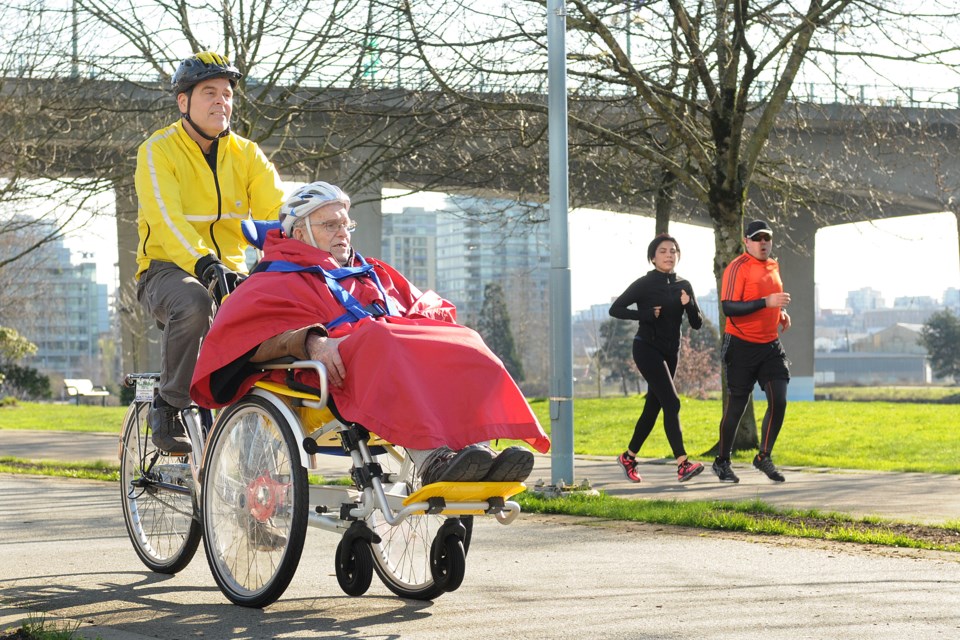Vancouverâs evolution into a cycling city has seen many unlikely winners, not the least of whom are the residents of , a non-profit senior care facility located steps from the newly completed, 30-kilometre Seaside Greenway.
In early 2009, as the city was making its first investments in AAA â all ages and abilities â bike infrastructure, the staff at Yaletown House learned about a custom-built tricycle from Germany. This Ìýwas designed to give people with limited mobility, including anyone in a wheelchair, a new way to get outside and experience the world around them.
Within months, Yaletown House raised enough money to buy one of the trikes. A generous donation came from Glen Paul, who recognized the potential to improve lives and who continues to volunteer to ensure the programâs on-going success.
Six years later, volunteersregularly take out residents for a spin in one of two Duet Bikes â the second one purchased (again through fundraising efforts) to meet increased demand and to provide an added level of sociability and safety to each outing.
Every ride begins with resident planning the route, including where, when, and how long they will stop.
âSome just want to go shopping downtown, while others long to see the majesty of Stanley Park,â said Paul.
As you can imagine, the sensory experience of getting back ona bicycle is both natural and exhilaratingÌýâ even for passengers seated in their wheelchair in front of the person pedalling. Research hasÌýshown fresh air and natural stimulants help reduceÌýfeelings of aggression and depression thatÌýcan be experienced when living in a careÌýhome.ÌýGetting outside can also improve daytime alertness and improved sleep at night.
Paul also stressed how valuable the bike can be for families trying to navigate difficult or awkward visits with a love one who has dementia or Alzheimerâs. FamilesÌýare encouraged to take their elderly relative for a spin, providing them all with quality time together, potentially stirring up fond, long-forgotten memories of riding a bike as a child, and making thevist more rewarding.Ìý
But according to Paul, the Duetâs greatest advantage is its ability to break down social barriers.
âItâs the perfect ice-breaker, allowing people to feel comfortablestriking up conversations with residents and vice versa. It also allows residents to participate as peers in the quintessential Â鶹´«Ã½Ó³»activity â interacting on the Sea Wall â making them feel a part of the city,â he said.
Ìý
Fostering these connections is what makes an intergenerational community work, and why Yaletown House deserves to be commended for its proactive approach.
While there isnât another care facility in Â鶹´«Ã½Ó³»currently offering a Duet Bike program, the concept is spreading quickly to (bicycle-friendly) streets around the world. Often dubbed the Ìýmovement, 18 different countries now offer such a scheme, with Ìý(unsurprisingly) leading the pack with more than 150 rickshaws rolling across the cycle tracks of 37 municipalities.
Inspired? You can channel that feeling.
Yaletown House is actively seeking volunteers to take residents out on Duet Bike rides. In fact, itâs the single biggest barrier that keeps residents from using the trikes more often. Interested parties can contact Cori Witvoet to begin the application process. Reach her at 604-806-4206.
Our city can be a place where the elderly are welcome and celebrated. As our population continues to age, and city officials continue to invest in safe, separated spaces for cycling, itâs only a matter of time before these Duet Bikes become a regular fixture on our cityâs plentiful bikeways.
Chris Bruntlett is a co-founder of Modacity and is inspired to live a happy life of urban mobility. Reach him atÌý[email protected].Ìý



